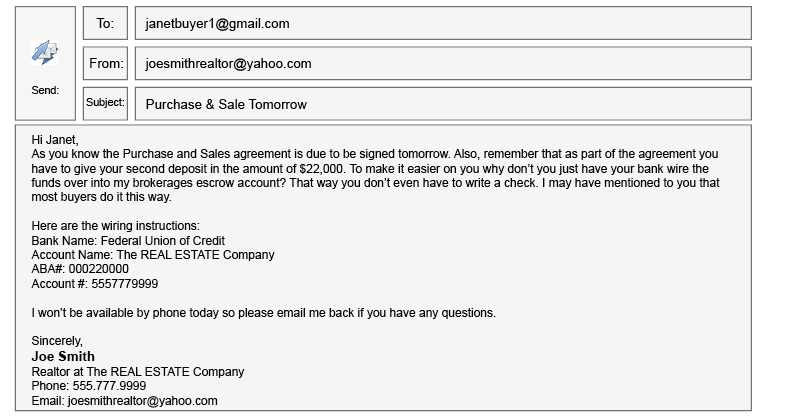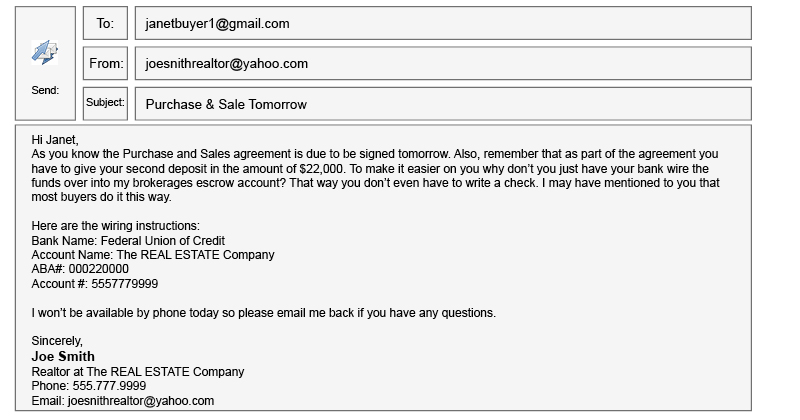
The internet complaint center of the Federal Bureau of Investigation has seen an almost three-fold increase in identified victims who have actually lost money since January 2015, and now that everyone has been operating at home for the last few years most transactions are virtual. Over the year, more and more instances have occurred in the real estate industry where buyers have wired funds, either for a purchase and sale deposit or closing funds to a hacker, and have had their hard-earned money vanish into thin air.
Imagine this scenario, you have worked hard and saved up money to buy your dream home. You find the perfect home, make an offer that the seller accepts, the home inspection goes well, and you are excited to move forward. Then right before your purchase and sale agreement is due, you get an email from your agent…or so it seems, asking for the deposit to be wired to their brokerage or the listing brokerage.
Unsuspecting, you wire the money over because you believe it to be from a reputable source. Your agent calls you two hours later to set up a time to meet and sign the purchase and sale agreement. The agent says “don’t forget to bring your deposit check” on that call. At that moment, you realize the money was not wired to the brokerage and that your agent never sent that email! The money is GONE!
This has happened with both purchase and sale deposits and closing funds and it has occurred on multiple occasions. It has also happened to very reputable REALTORS®, real estate agencies, responsible buyers, and law firms. Do not be fooled into thinking this couldn’t happen to you!
How does this scam work?
This money wiring scheme is complicated and crafty. Scammers infiltrate a real estate agent’s email account and they watch and observe the time frame from offer acceptance to purchase and sale execution all the way to the days leading up to the closing. Once one of these events is within sight, they create an email address very similar to that of the agent involved.
Let’s take this example, the agent’s name is Joe Smith and he works for The REAL ESTATE Company, and Janet, the home buyer, has recently decided to purchase one of his listings. Can you spot which correspondence is legit and which is the scam?
Email A

*All of the information in these emails are fabricated, these numbers are not actual account numbers.
Email B

*All of the information in these emails are fabricated, these numbers are not actual account numbers.
At first glance, these emails seem exactly the same but if you examine the “From” fields closer they have switched the email name from joesmithrealtor@yahoo.com to joesnithrealtor@yahoo.com. This is what makes the scam work, the email is just similar enough to fly under the radar and their timing is at the most vulnerable point in the buying process.
This email is then sent to the buyer from this slightly different email with instructions on how to wire the money prior to the purchase and sale signing or closing, in an effort to make everything go smoother. And there you have it, the money is gone!
So how do you avoid these scams?
If you are in the process of buying a home and you receive any emails about wiring money DO NOT do it without speaking directly to your REALTOR®! Call them immediately to let them know about the message and to verify its legitimacy. If it turns out to be a farce, you and your agent should report it to the FBI immediately!
Tips to prevent these hackers from attacking you!
Tips for Buyers and Sellers:
- Be very careful emailing any financial information. You may think you are just sending the numbers to a trusted friend or colleague but unfortunately, email servers are not always secure.
- Emails from contacts you do not know may very well be a scam. If you do not know the sender delete the email and do not open any attachments.
- If you do know the sender but something doesn’t seem right when in doubt, call them and make sure the email is legitimate.
- Have verbal communication often with your REALTOR so you both know the plan for deposits, etc.
Tips for REALTORS®:
- Conduct business by using a secure company email platform instead of your own personal email, such as Yahoo or Gmail. This will make it more difficult for the hackers to infiltrate and create an email address if it is on a company-hosted server.
- Be sure to warn your clients of these scams to help them better protect themselves and to decrease their chances of being targeted.
- Change your passwords often and make sure the passwords you choose are secure.
- Have verbal communication often with your buyers so you both know the plan for deposits, etc.
For more information on this scam and the alert from the FBI’s Boston Field Office Click Here.
Report your Florida scam or cybercrime to the Florida Department of Law Enforcement here.
If you believe that you may have been a victim of this in the past, you can go to the FTC’s website and file a complaint immediately.
